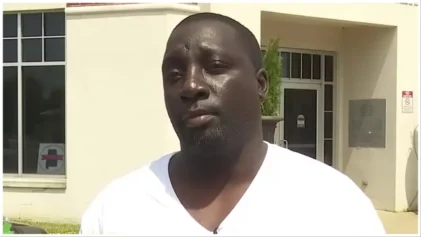Two deputies in West Virginia are being sued over claims of violating the civil rights of a Black U.S. military veteran when they arrested him for not giving them his name. The officers are accused of racially profiling him, coming on his property with the express suspicion that the man or his family were growing cannabis.
On Tuesday, Aug. 9, lawyers for Jason B. Tartt and husband and wife Donnie and Ventriss Hairston, filed a federal lawsuit with the U.S. District Court for the Southern District of West Virginia against deputies Dalton T. Martin and Jordan A. Horn, both employed by the McDowell County Sheriff’s Office, James “Boomer” Muncy and McDowell County Commission, a West Virginia Political Subdivision, over claims those parties violated the three’s rights protected by the First, Fourth and Fourteenth Amendments.
The plaintiffs are demanding a trial by jury.
According to the complaint obtained by Atlanta Black Star, on Aug. 7, 2020, three African-American residents of McDowell County experienced “unlawful and outrageous racial profiling, harassment and retaliation … based on nothing other than the plaintiffs’ skin color.”
Officers accused Donnie and Ventriss Hairston “of growing four marijuana plants located in overgrown brush at a nearby property owned by a third party.”
In a statement, civil rights lawyer John H. Bryan, who is representing the three plaintiffs, detailed what allegedly happened.
Bryan said the husband and wife “were sitting on the front porch of their rural home when two deputies approached and began to harass and intimidate them.”
“Their landlord, who lives next door, joined them shortly afterward and began to ask questions,” he continued. “When they asserted their opinions and rights, retaliation ensued. The landlord, Jason Tartt, was seized and arrested. The Hairston’s were shoved into their home against their will.”
The attorney released the officers’ bodycam footage and commentary. Over 16:45 minutes, he shows and explains what happened from the initial confrontation leading up to the arrest.
It opens with Ventriss asking the officers for their names.
“Just because of the season we are living in, I think it’s important that we have your names,” the older woman states. “Having your names makes me feel more secure.”
As she explains why she is asking them to identify themselves, she informs the two deputies her family moved in on Tuesday, June 28, remarking, “We’re actually new here. And for the police officers to come up here and ask, ‘Are you growing marijuana?’ that is preposterous to me.”
After a while, Tartt, the couple’s landlord, came over after receiving a call from the Hairstons, both in their 60s, about the officers being at the home.
The lawsuit said, “When the plaintiffs expressed criticism of their treatment by the officers, occurring on their own front porch, and asked for the names of the two officers for their own protection, the two defendant officers engaged in an egregious abuse of authority by retaliating against them, harassing them, physically forcing the Hairstons inside the front door of their home, preventing them from witnessing and recording the misconduct being perpetrated by the defendant officers.”
“After Plaintiff Jason Tartt, a former Military Policeman questioned the authority of the officers to engage in the unlawful racial profiling and mistreatment of himself and his tenants, the defendant officers engaged in unlawful retaliation against Mr. Tartt, including a false arrest and incarceration,” the complaint continued. “The charge was later dismissed.”
In the police report, according to Bluefield Daily Telegraph, Martin wrote, “Upon our arrival, we incountered [sic] by two elderly subjects who was [sic] on the porch and asked them if they growed [sic] marijuana and they stated ‘No.’”
The lawsuit says after the couple said they were not growing the schedule 1 substance under the Controlled Substances Act, the officer did not leave but chose, according to the lawsuit, to “intimidate and upset the Hairston’s.”
According to the filing, Deputy Martin knew all along the cannabis plants were “not located on any property owned by Mr. Tartt,” but still did not leave and continued to treat the couple disrespectfully. The disrespect carried over into the arrest.
“Defendant Martin then walked onto the front porch and physically seized Mr. Tartt, forcibly removing him off the front porch and taking him onto the driveway,” the lawsuit stated. “As Donnie and Ventriss Hairston attempted to video and witness what was happening, Defendant Martin physically forced them to stop and to go inside their home.”
“While standing on the Hairstons’ front porch, Defendant Martin physically placed his hands on Mr. Hairston and pushed him inside his own front door, closing the door behind him. Martin and Horn then placed Mr. Tartt in handcuffs and placed him in the cruiser. He was driven to Welch for processing and subsequent incarceration,” the claim stated.
The officers hit Tartt with an obstruction of justice charge that was later dismissed by a McDowell County Magistrate Court two months later. According to the order, it was “dismissed by [Prosecuting Attorney], Officer failed to appear to prosecute.”
Bryan wrote in the lawsuit that Tartt was a victim of a “false warrantless” arrest.
The lawsuit said, “No reasonable police officer in either of the defendant police officers’ positions on August 7, 2020, would have believed that probable cause existed to make a warrantless arrest of the Plaintiff under the totality of the circumstances as described…”
The plaintiffs believe they were victims of malicious prosecution, alleging the deputies “filed with the Magistrate Court of McDowell County maliciously and for the improper purpose of retaliation in response to protected free speech, as well as for the improper purposes of harassment.”
Tartt states he “suffered damages, for which he is entitled to recover,” especially after undergoing “the humiliating process of being arrested, incarcerated and charged.”
In the filing, Bryan alleges another count saying the Hairstons experienced an “unreasonable seizure.”
“Defendant Martin entered the private property, curtilage, as well as the front porch of Mr. and Mrs. Hairston on August 7, 2020,” the document claims. “He and Defendant Horn remained on the property against their will, detaining them for an unreasonable amount of time, interrogating them against their will, making them feel scared and unsafe. Defendant Martin and Horn confined the Hairstons, detaining them in the absence of either reasonable suspicion or probable cause.”
Continuing by saying “at no time did the defendant officers have a warrant to arrest or search or seize any person or property at the subject property. At no time did the defendant officers have valid consent to remain on the subject property during the events described above. At no time were the defendant officers presented with exigent circumstances entitling them to invade the sanctity of the plaintiffs’ home on August 7, 2020.”
The fourth claim is for unlawful “retaliation,” while the fifth claim alleged the officers’ actions were a “conspiracy to deprive” the couple of their civil liberties, saying, “Defendants Martin and Horn, conspired for the purpose of depriving, either directly or indirectly, the plaintiffs of the equal protection of the laws of the United States and/or of the equal privileges and immunities under the laws of the United States … They were targeted as suspects in the defendant officers’ marijuana plant investigation just by virtue of their being African Americans.”
Tart and the Hairstons are asking the court to award them compensatory and punitive damages should they emerge victorious in the suit. The three are also asking their attorney fees and costs, within reason, be addressed by the defendants.


